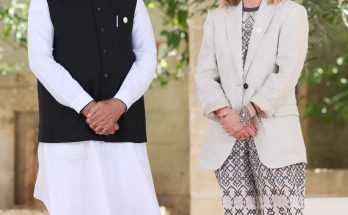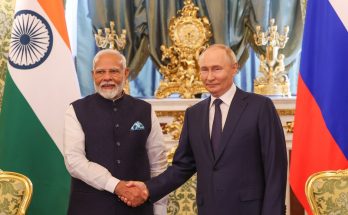By Dr Vijay Chauthaiwale
G20 presidency is a watershed moment in India’s history as the country emerges as a provider of global solutions to a wide array of cross-cutting challenges. In a conflicted world, India will seek to promote just and equitable growth for all in a sustainable, holistic, responsible, and inclusive manner, says Dr Vijay Chauthaiwale.
India assumed the G20 Presidency from Indonesia on December 1, 2022. India will host the G20 Leaders’ Summit for the first time in 2023 since the formation of the G20 in 1999. Globally, G20 countries account for 85% of GDP, 75% of trade and 60% of population. In addition, India has invited nine countries from the developing world, including some neighbouring countries.
The G20 summit India will host on September 9-10, 2023 will be the largest multilateral summit that India has ever hosted. For the first time, all the world’s largest economies will be attending a summit in India, including the permanent members of the UN Security Council. Therefore, it is being considered as the watershed moment in the history of India, which is deeply committed to democracy and multilateralism.
In recent years, India has played an important role in the international arena as it has been a key player in providing pragmatic global solutions for the wellbeing of all. Shri Narendra Modi, Hon’ble Prime Minister of India, unveiled the logo and theme of the G20 summit for the upcoming year. In his address, he stated: “The lotus in the logo symbolises India’s ancient heritage, faith and thought. The Philosophy of Advaita Vedanta emphasises the oneness of all creatures and this philosophy will be a medium of resolution of today’s conflicts.”
Showcasing India’s Diversity
To showcase India’s diversity, G20 meetings will be held throughout India, including the less explored parts and the biggest cities of the country. Meetings are planned to cover each region of the country to showcase the beauty and diversity of India. Around 200 events will be organised in around 56 cities as compared to the earlier G20 summits, which were mostly confined to a few cities in a country.
Through G20, the Indian government plans to connect with people from different parts of the country at all district and block levels, inspired by the Hon’ble Prime Minister Narendra Modi’s unique vision for “Jan Bhagidari” (public partnership) of involving the masses in the process of development.
Consensus and Coexistence
India’s G20 presidency is unfolding at a time when the world is still facing the aftereffects of the pandemic and all the countries are recalibrating their plans to survive the global economic uncertainties. As some of the nations have become bankrupt and a few are involved in the war, it is difficult to ensure all the issues are addressed and consensus is forged. India is the “Mother of Democracy” from ancient times and the concept of creating consensus has always been part of our ethos. As a country, we believe in coexistence and has always promoted oneness. Therefore, the theme of the summit emphasizes on the idea of development for all. Prime Minister Modi has also stressed to work together on global challenges like climate change and pandemic, which can be tackled only through coordinated efforts from all the countries.
Unheard Voices
It is expected that during India’s G20 presidency, there will be special focus on the “unheard voices” of the Global South in order to achieve inclusive growth in the midst of economic issues like rising debt, inflation and the Ukraine-Russia war. Discussions at various levels of the summit are expected to stress on the need for greater inclusivity of developing nations in international forums, especially ensuring an enhanced role of the Global South in global decision-making.
In recent years, India has risen in the international hierarchy and is expected to become the third largest economy by 2030. Global South is a huge economic and geopolitical opportunity from India’s perspective and through G20 it will try to focus more on issues pertaining to the developing world such as deglobalisation, post-pandemic complications, economic slowdown and climate change.
PM Modi is expected to interact with these countries before the G20 summit in New Delhi in September 2023. Going forward, India can be a bridge between the developed North and the developing South by bringing both on a platform like G20. India will look towards bringing a balance between the ambitions of the developed nations and the expectations of the developing countries.
Global Solutions

Today the world is looking at India from the perspective of providing solutions for global issues. India now is equipped enough to lead the world towards a better tomorrow. India believes in engaging with every player in the global arena with the intent to promote mutual interest; never before has the Indian foreign policy been this flexible. India will also look forward to share its experiences and technological advancements with the rest of the world, especially the developing countries. India will showcase its major achievement in improving the environment and health of women through schemes like Ujjwala Yojana and also its success in digital payments, direct benefit transfers, economic security and healthcare management. It will try to connect with other nations on data-related capacity-building and welfare schemes linked with digital transformation to accelerate progress of the developing world.
On global issues like Covid-19 pandemic, Russia-Ukraine war, inflation and the economic slowdown, India’s presidency will take a stance to ensure perspective and interests of the Global South are reflected in discussions and outcomes in the run-up to the summit in Delhi. Above all, India will showcase its civilisational values and the philosophy of “Vasudhaiva Kutumbakam,” from which the theme of India’s G20 presidency — “One Earth, One Family, One Future” – is derived. In a divided and conflicted world, the G20 presidency and the upcoming G20 summit will strive for just and equitable growth for all in a sustainable, holistic, responsible, and inclusive manner.
Vijay ChauthaiwaleAuthor Profile
- India Writes Network (www.indiawrites.org) is an emerging think tank and a media-publishing company focused on international affairs & the India Story. Centre for Global India Insights is the research arm of India Writes Network. To subscribe to India and the World, write to editor@indiawrites.org. A venture of TGII Media Private Limited, a leading media, publishing and consultancy company, IWN has carved a niche for balanced and exhaustive reporting and analysis of international affairs. Eminent personalities, politicians, diplomats, authors, strategy gurus and news-makers have contributed to India Writes Network, as also “India and the World,” a magazine focused on global affairs.
Latest entries
 In ConversationJuly 26, 2024India-Italy defence collaboration can extend to third countries: Anil Wadhwa
In ConversationJuly 26, 2024India-Italy defence collaboration can extend to third countries: Anil Wadhwa In ConversationJuly 23, 2024Italy views India as a key partner in Indo-Pacific: Vani Rao
In ConversationJuly 23, 2024Italy views India as a key partner in Indo-Pacific: Vani Rao DiplomacyJune 29, 2024First BRICS unveils a roadmap for boosting tourism among emerging economies
DiplomacyJune 29, 2024First BRICS unveils a roadmap for boosting tourism among emerging economies India and the WorldJune 11, 2024On Day 1, Jaishankar focuses on resolving standoff with China
India and the WorldJune 11, 2024On Day 1, Jaishankar focuses on resolving standoff with China







